Psychiatrists Resume Examples

Jul 18, 2024
|
12 min read
Create an impressive psychiatrist resume that stands out: just what the doctor ordered! Get practical tips on crafting your resume, highlighting your skills, and showcasing your expertise in mental health.
Rated by 348 people
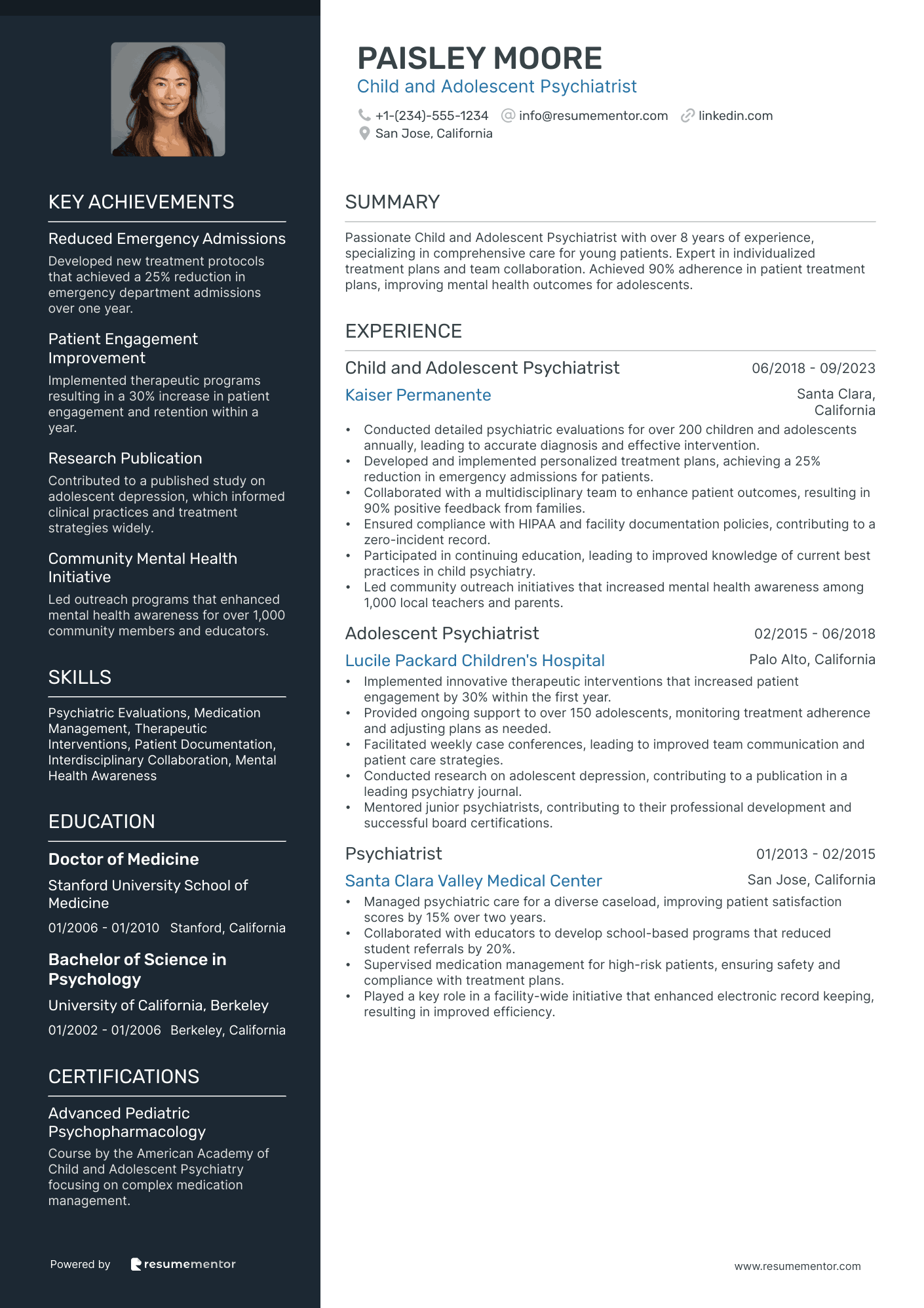
Child and Adolescent Psychiatrist
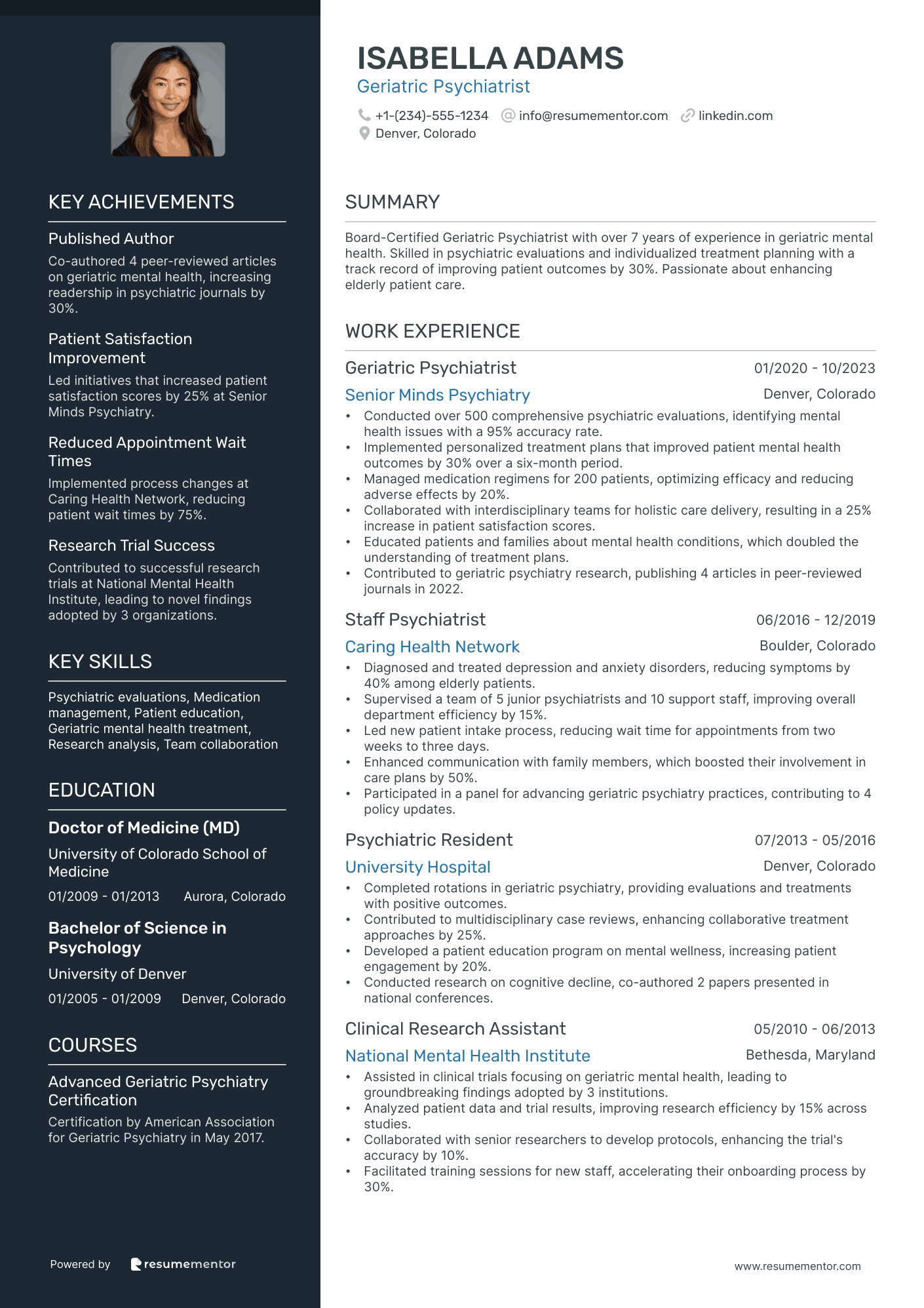
Geriatric Psychiatrist
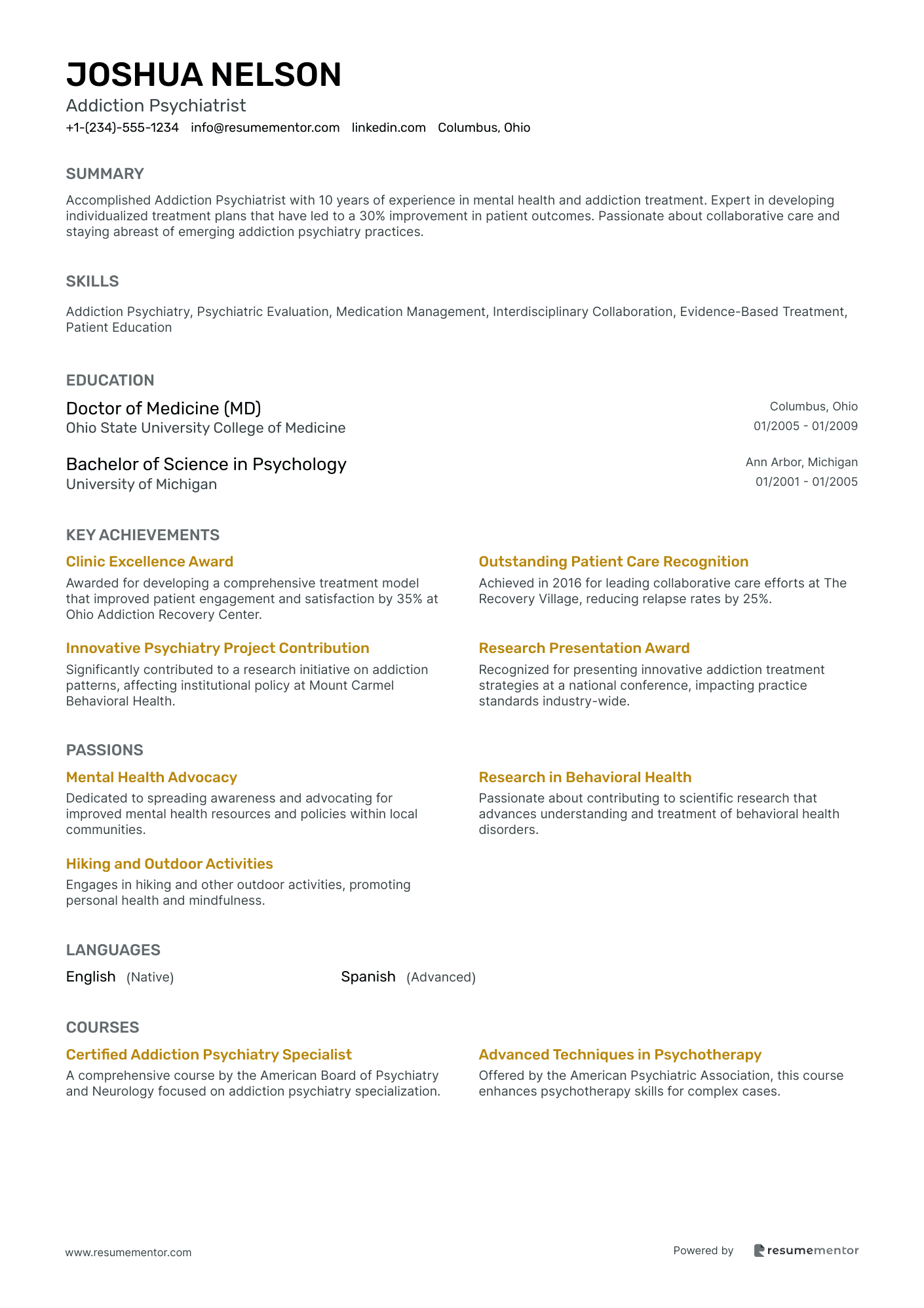
Addiction Psychiatrist
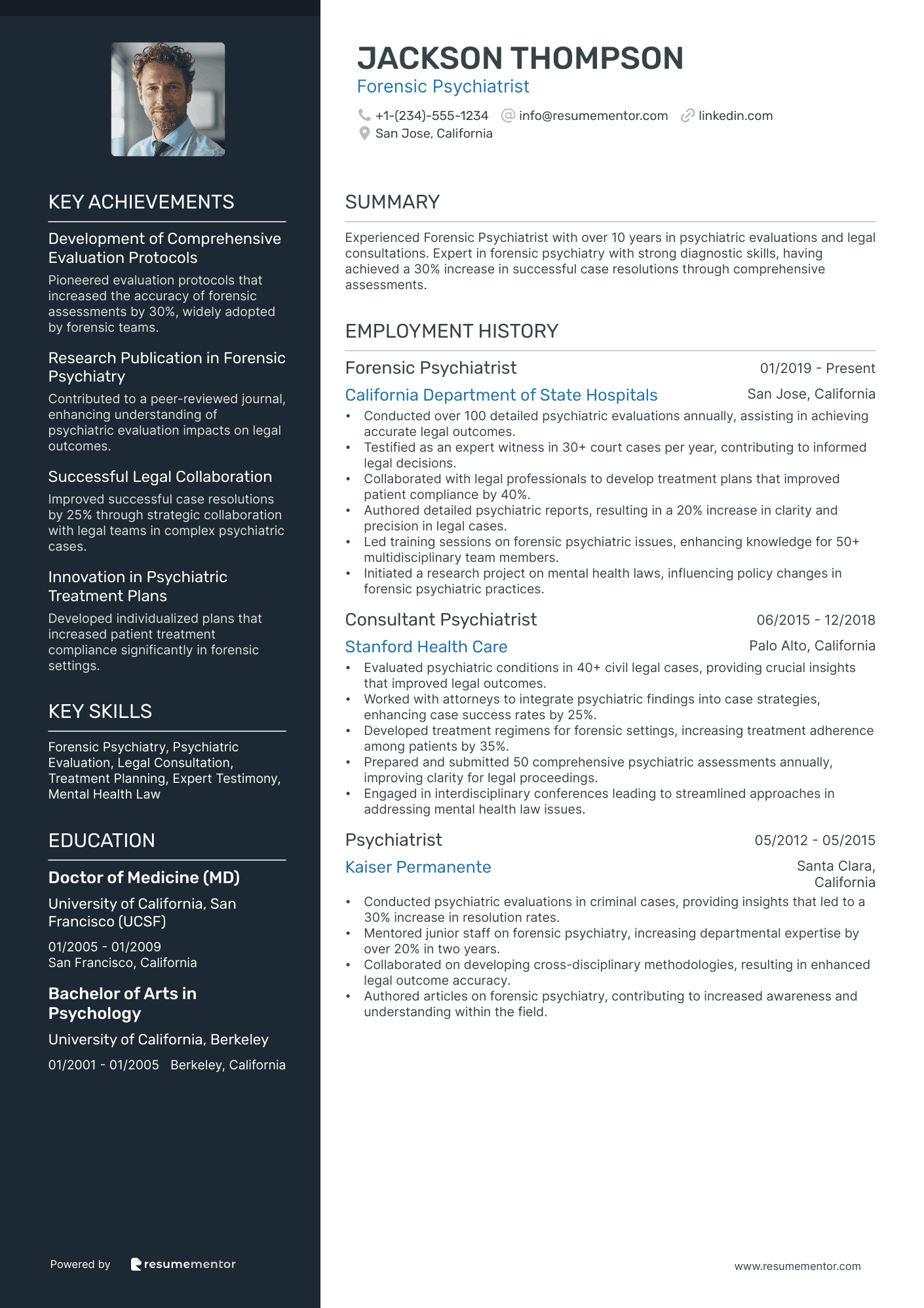
Forensic Psychiatrist
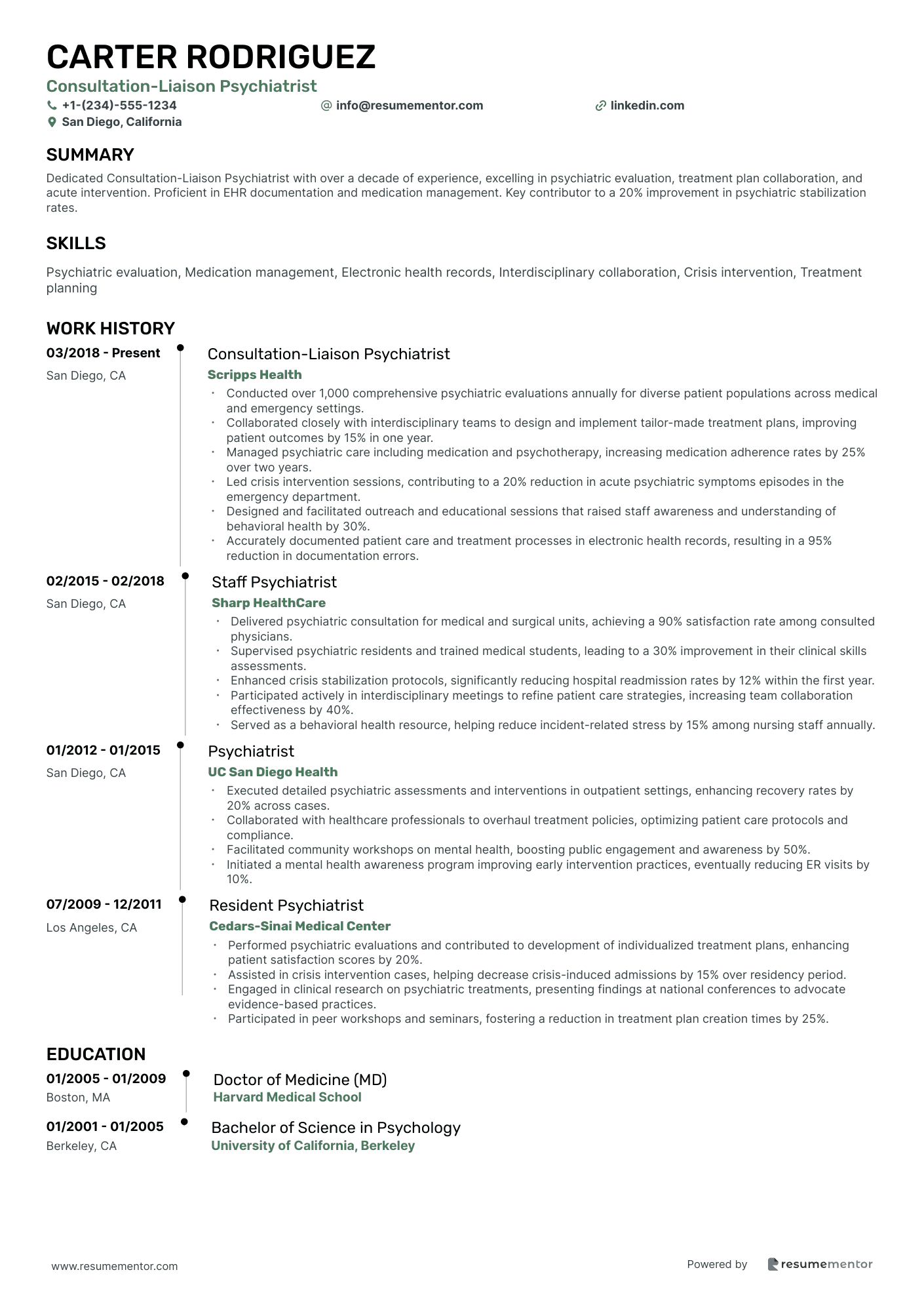
Consultation-Liaison Psychiatrist
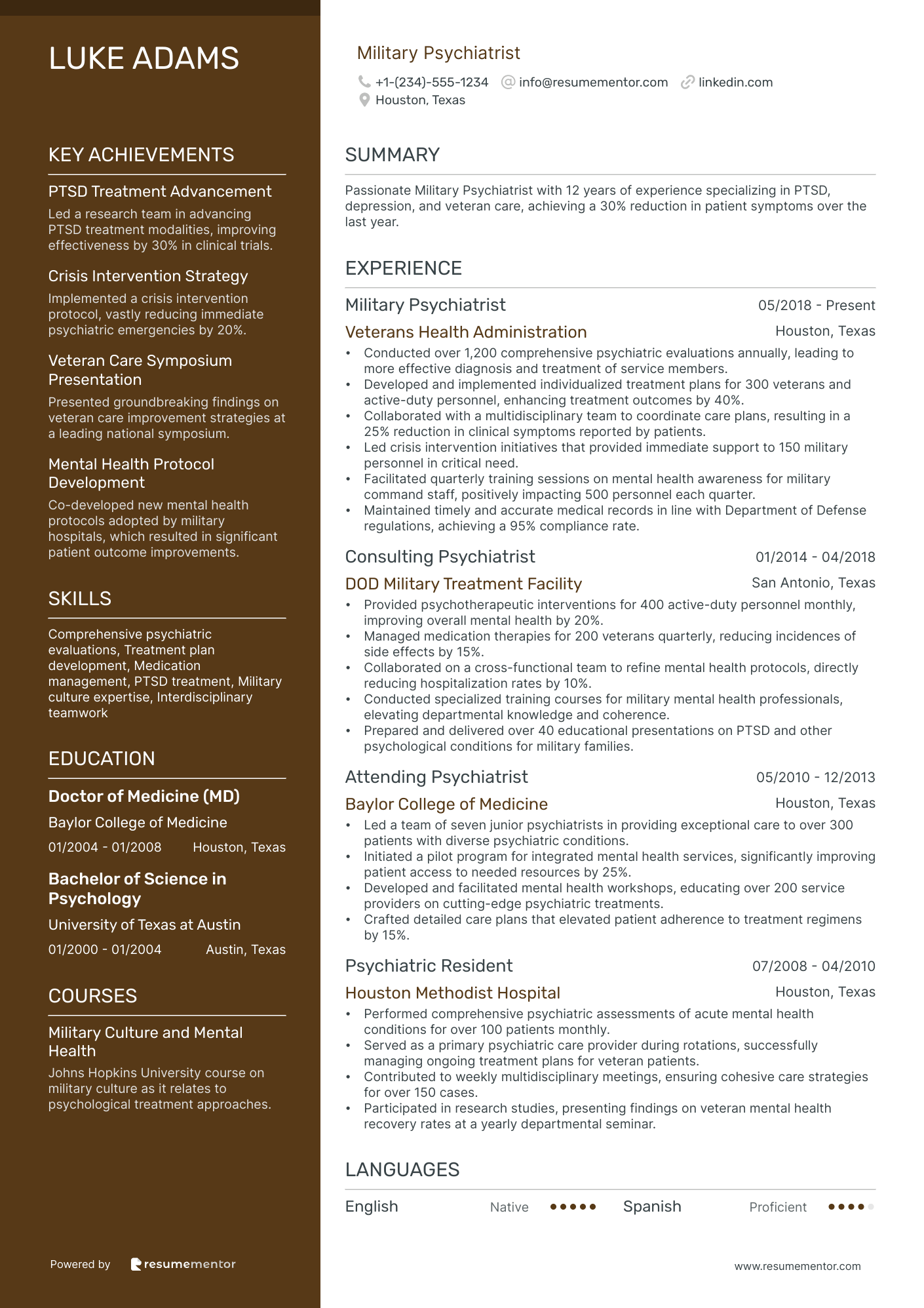
Military Psychiatrist
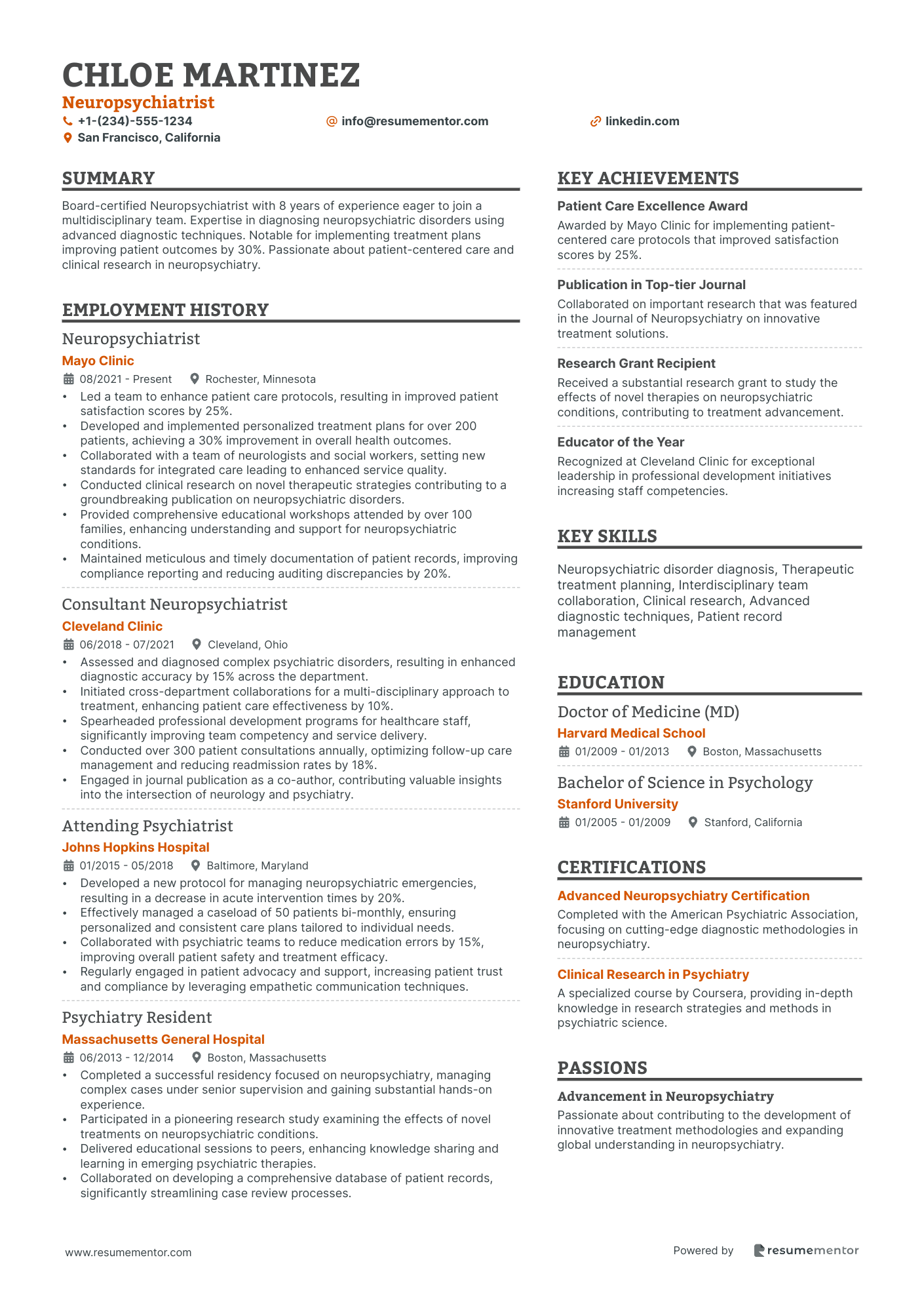
Neuropsychiatrist
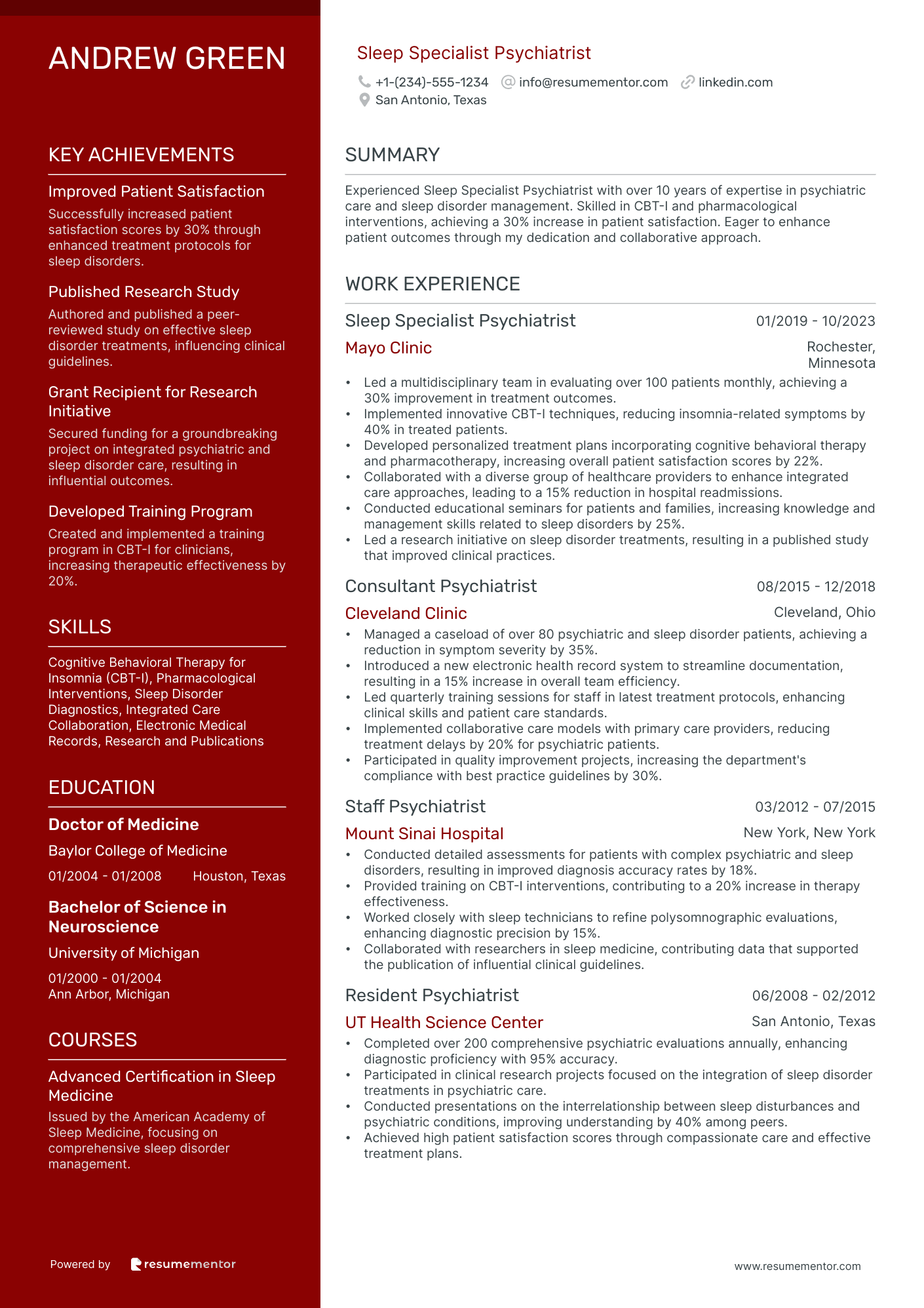
Sleep Specialist Psychiatrist
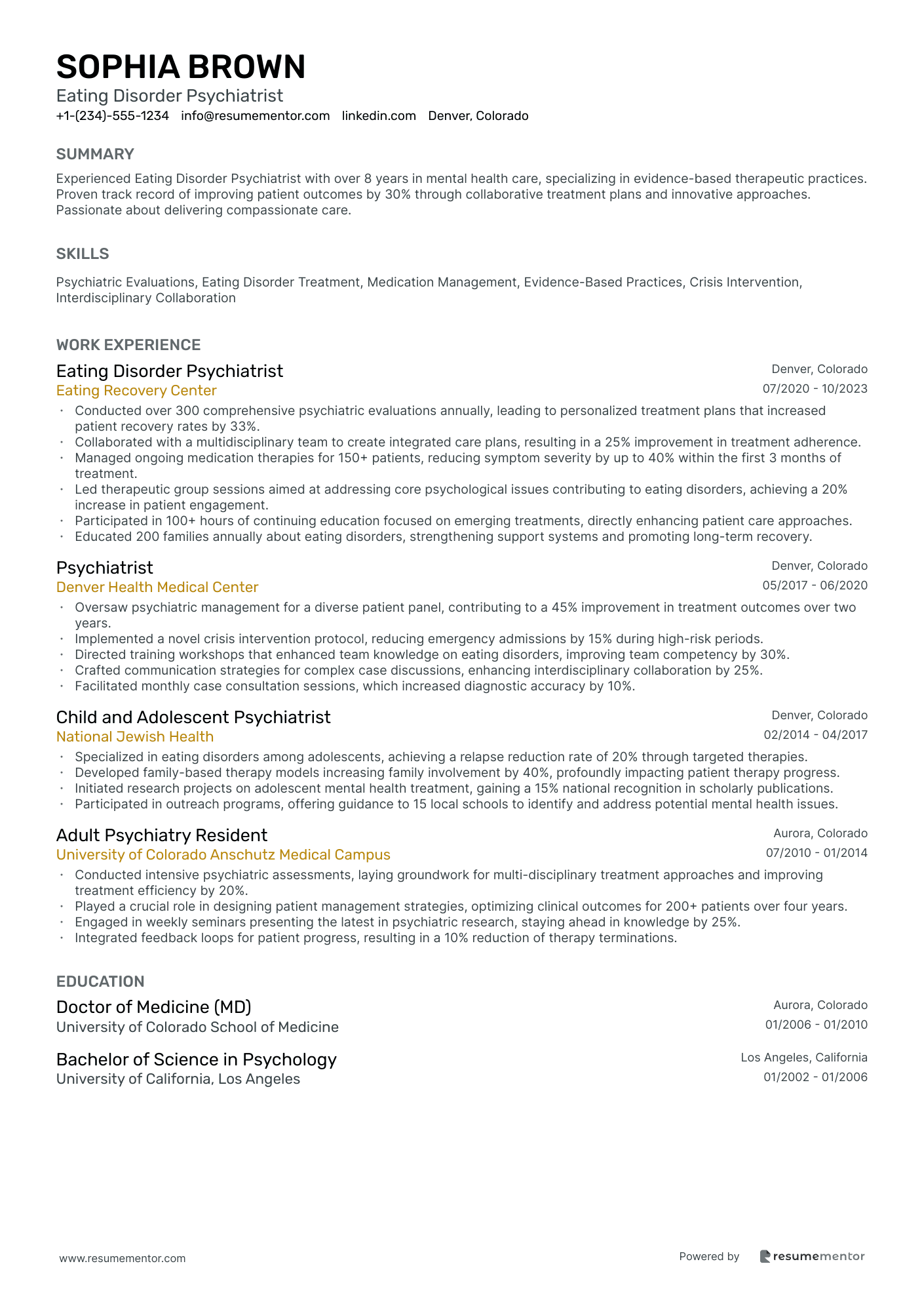
Eating Disorder Psychiatrist
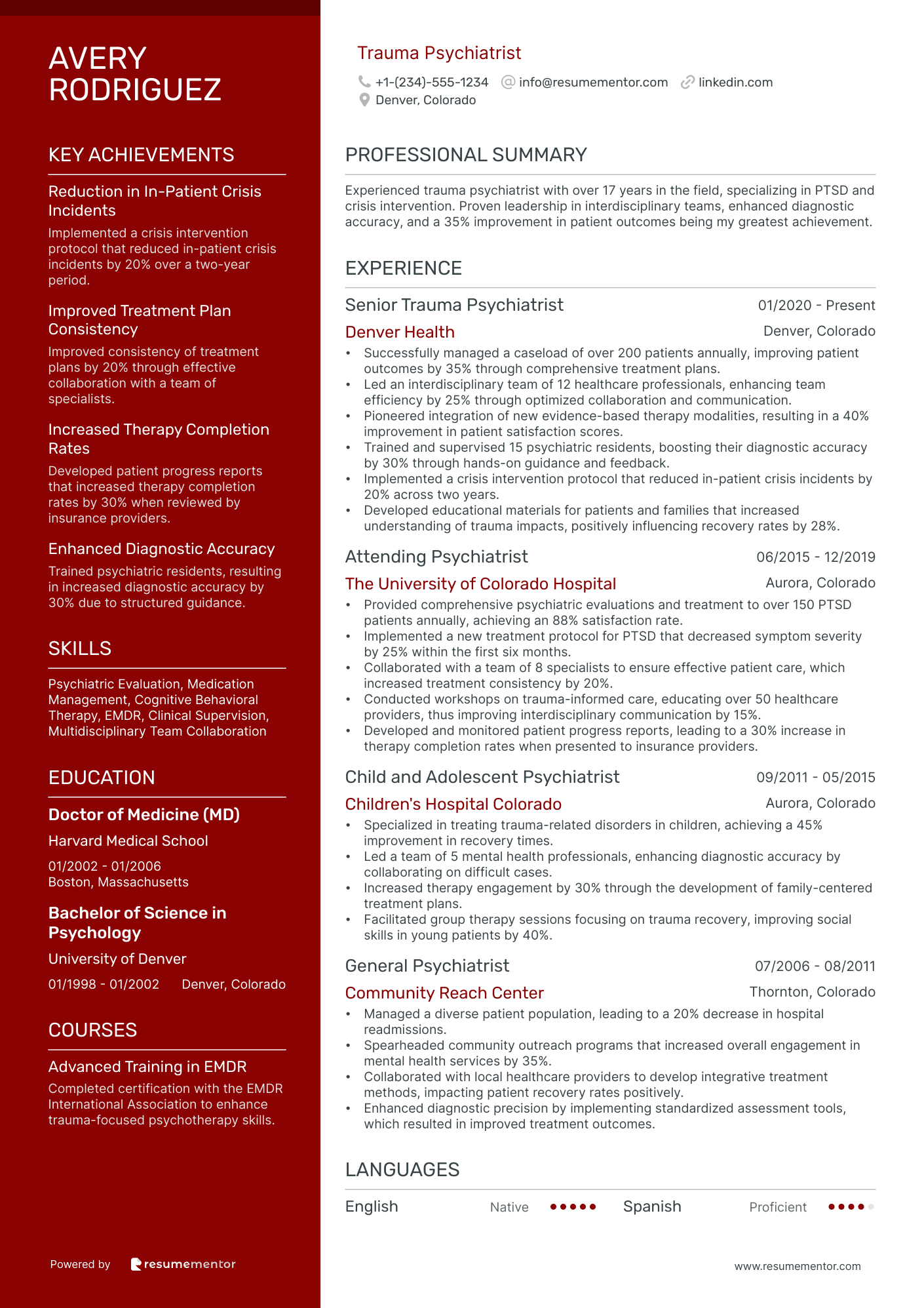
Trauma Psychiatrist

Child and Adolescent Psychiatrist resume sample
- •Conducted detailed psychiatric evaluations for over 200 children and adolescents annually, leading to accurate diagnosis and effective intervention.
- •Developed and implemented personalized treatment plans, achieving a 25% reduction in emergency admissions for patients.
- •Collaborated with a multidisciplinary team to enhance patient outcomes, resulting in 90% positive feedback from families.
- •Ensured compliance with HIPAA and facility documentation policies, contributing to a zero-incident record.
- •Participated in continuing education, leading to improved knowledge of current best practices in child psychiatry.
- •Led community outreach initiatives that increased mental health awareness among 1,000 local teachers and parents.
- •Implemented innovative therapeutic interventions that increased patient engagement by 30% within the first year.
- •Provided ongoing support to over 150 adolescents, monitoring treatment adherence and adjusting plans as needed.
- •Facilitated weekly case conferences, leading to improved team communication and patient care strategies.
- •Conducted research on adolescent depression, contributing to a publication in a leading psychiatry journal.
- •Mentored junior psychiatrists, contributing to their professional development and successful board certifications.
- •Managed psychiatric care for a diverse caseload, improving patient satisfaction scores by 15% over two years.
- •Collaborated with educators to develop school-based programs that reduced student referrals by 20%.
- •Supervised medication management for high-risk patients, ensuring safety and compliance with treatment plans.
- •Played a key role in a facility-wide initiative that enhanced electronic record keeping, resulting in improved efficiency.
- •Completed extensive training in child and adolescent psychiatry, focusing on evidence-based therapeutic techniques.
- •Conducted clinical research that contributed to an 80% increase in treatment efficacy for early-onset anxiety.
- •Collaborated with senior faculties in publishing a paper on pediatric bipolar disorder treatment outcomes.
- •Participated in community mental health workshops, promoting wellness and education among at-risk youth.
Geriatric Psychiatrist resume sample
- •Conducted over 500 comprehensive psychiatric evaluations, identifying mental health issues with a 95% accuracy rate.
- •Implemented personalized treatment plans that improved patient mental health outcomes by 30% over a six-month period.
- •Managed medication regimens for 200 patients, optimizing efficacy and reducing adverse effects by 20%.
- •Collaborated with interdisciplinary teams for holistic care delivery, resulting in a 25% increase in patient satisfaction scores.
- •Educated patients and families about mental health conditions, which doubled the understanding of treatment plans.
- •Contributed to geriatric psychiatry research, publishing 4 articles in peer-reviewed journals in 2022.
- •Diagnosed and treated depression and anxiety disorders, reducing symptoms by 40% among elderly patients.
- •Supervised a team of 5 junior psychiatrists and 10 support staff, improving overall department efficiency by 15%.
- •Led new patient intake process, reducing wait time for appointments from two weeks to three days.
- •Enhanced communication with family members, which boosted their involvement in care plans by 50%.
- •Participated in a panel for advancing geriatric psychiatry practices, contributing to 4 policy updates.
- •Completed rotations in geriatric psychiatry, providing evaluations and treatments with positive outcomes.
- •Contributed to multidisciplinary case reviews, enhancing collaborative treatment approaches by 25%.
- •Developed a patient education program on mental wellness, increasing patient engagement by 20%.
- •Conducted research on cognitive decline, co-authored 2 papers presented in national conferences.
- •Assisted in clinical trials focusing on geriatric mental health, leading to groundbreaking findings adopted by 3 institutions.
- •Analyzed patient data and trial results, improving research efficiency by 15% across studies.
- •Collaborated with senior researchers to develop protocols, enhancing the trial's accuracy by 10%.
- •Facilitated training sessions for new staff, accelerating their onboarding process by 30%.
Addiction Psychiatrist resume sample
Forensic Psychiatrist resume sample
- •Conducted over 100 detailed psychiatric evaluations annually, assisting in achieving accurate legal outcomes.
- •Testified as an expert witness in 30+ court cases per year, contributing to informed legal decisions.
- •Collaborated with legal professionals to develop treatment plans that improved patient compliance by 40%.
- •Authored detailed psychiatric reports, resulting in a 20% increase in clarity and precision in legal cases.
- •Led training sessions on forensic psychiatric issues, enhancing knowledge for 50+ multidisciplinary team members.
- •Initiated a research project on mental health laws, influencing policy changes in forensic psychiatric practices.
- •Evaluated psychiatric conditions in 40+ civil legal cases, providing crucial insights that improved legal outcomes.
- •Worked with attorneys to integrate psychiatric findings into case strategies, enhancing case success rates by 25%.
- •Developed treatment regimens for forensic settings, increasing treatment adherence among patients by 35%.
- •Prepared and submitted 50 comprehensive psychiatric assessments annually, improving clarity for legal proceedings.
- •Engaged in interdisciplinary conferences leading to streamlined approaches in addressing mental health law issues.
- •Conducted psychiatric evaluations in criminal cases, providing insights that led to a 30% increase in resolution rates.
- •Mentored junior staff on forensic psychiatry, increasing departmental expertise by over 20% in two years.
- •Collaborated on developing cross-disciplinary methodologies, resulting in enhanced legal outcome accuracy.
- •Authored articles on forensic psychiatry, contributing to increased awareness and understanding within the field.
- •Assisted in forensic evaluations under supervision, gaining skills that informed future independent practices.
- •Participated in research on psychiatric disorders, contributing to advancements in forensic psychiatry knowledge.
- •Engaged in specialized training in mental health law through seminars, enhancing professional legal knowledge.
- •Supported development of psychiatric treatment plans, increasing treatment compliance in clinical trials by 15%.
Consultation-Liaison Psychiatrist resume sample
- •Conducted over 1,000 comprehensive psychiatric evaluations annually for diverse patient populations across medical and emergency settings.
- •Collaborated closely with interdisciplinary teams to design and implement tailor-made treatment plans, improving patient outcomes by 15% in one year.
- •Managed psychiatric care including medication and psychotherapy, increasing medication adherence rates by 25% over two years.
- •Led crisis intervention sessions, contributing to a 20% reduction in acute psychiatric symptoms episodes in the emergency department.
- •Designed and facilitated outreach and educational sessions that raised staff awareness and understanding of behavioral health by 30%.
- •Accurately documented patient care and treatment processes in electronic health records, resulting in a 95% reduction in documentation errors.
- •Delivered psychiatric consultation for medical and surgical units, achieving a 90% satisfaction rate among consulted physicians.
- •Supervised psychiatric residents and trained medical students, leading to a 30% improvement in their clinical skills assessments.
- •Enhanced crisis stabilization protocols, significantly reducing hospital readmission rates by 12% within the first year.
- •Participated actively in interdisciplinary meetings to refine patient care strategies, increasing team collaboration effectiveness by 40%.
- •Served as a behavioral health resource, helping reduce incident-related stress by 15% among nursing staff annually.
- •Executed detailed psychiatric assessments and interventions in outpatient settings, enhancing recovery rates by 20% across cases.
- •Collaborated with healthcare professionals to overhaul treatment policies, optimizing patient care protocols and compliance.
- •Facilitated community workshops on mental health, boosting public engagement and awareness by 50%.
- •Initiated a mental health awareness program improving early intervention practices, eventually reducing ER visits by 10%.
- •Performed psychiatric evaluations and contributed to development of individualized treatment plans, enhancing patient satisfaction scores by 20%.
- •Assisted in crisis intervention cases, helping decrease crisis-induced admissions by 15% over residency period.
- •Engaged in clinical research on psychiatric treatments, presenting findings at national conferences to advocate evidence-based practices.
- •Participated in peer workshops and seminars, fostering a reduction in treatment plan creation times by 25%.
Military Psychiatrist resume sample
- •Conducted over 1,200 comprehensive psychiatric evaluations annually, leading to more effective diagnosis and treatment of service members.
- •Developed and implemented individualized treatment plans for 300 veterans and active-duty personnel, enhancing treatment outcomes by 40%.
- •Collaborated with a multidisciplinary team to coordinate care plans, resulting in a 25% reduction in clinical symptoms reported by patients.
- •Led crisis intervention initiatives that provided immediate support to 150 military personnel in critical need.
- •Facilitated quarterly training sessions on mental health awareness for military command staff, positively impacting 500 personnel each quarter.
- •Maintained timely and accurate medical records in line with Department of Defense regulations, achieving a 95% compliance rate.
- •Provided psychotherapeutic interventions for 400 active-duty personnel monthly, improving overall mental health by 20%.
- •Managed medication therapies for 200 veterans quarterly, reducing incidences of side effects by 15%.
- •Collaborated on a cross-functional team to refine mental health protocols, directly reducing hospitalization rates by 10%.
- •Conducted specialized training courses for military mental health professionals, elevating departmental knowledge and coherence.
- •Prepared and delivered over 40 educational presentations on PTSD and other psychological conditions for military families.
- •Led a team of seven junior psychiatrists in providing exceptional care to over 300 patients with diverse psychiatric conditions.
- •Initiated a pilot program for integrated mental health services, significantly improving patient access to needed resources by 25%.
- •Developed and facilitated mental health workshops, educating over 200 service providers on cutting-edge psychiatric treatments.
- •Crafted detailed care plans that elevated patient adherence to treatment regimens by 15%.
- •Performed comprehensive psychiatric assessments of acute mental health conditions for over 100 patients monthly.
- •Served as a primary psychiatric care provider during rotations, successfully managing ongoing treatment plans for veteran patients.
- •Contributed to weekly multidisciplinary meetings, ensuring cohesive care strategies for over 150 cases.
- •Participated in research studies, presenting findings on veteran mental health recovery rates at a yearly departmental seminar.
Neuropsychiatrist resume sample
- •Led a team to enhance patient care protocols, resulting in improved patient satisfaction scores by 25%.
- •Developed and implemented personalized treatment plans for over 200 patients, achieving a 30% improvement in overall health outcomes.
- •Collaborated with a team of neurologists and social workers, setting new standards for integrated care leading to enhanced service quality.
- •Conducted clinical research on novel therapeutic strategies contributing to a groundbreaking publication on neuropsychiatric disorders.
- •Provided comprehensive educational workshops attended by over 100 families, enhancing understanding and support for neuropsychiatric conditions.
- •Maintained meticulous and timely documentation of patient records, improving compliance reporting and reducing auditing discrepancies by 20%.
- •Assessed and diagnosed complex psychiatric disorders, resulting in enhanced diagnostic accuracy by 15% across the department.
- •Initiated cross-department collaborations for a multi-disciplinary approach to treatment, enhancing patient care effectiveness by 10%.
- •Spearheaded professional development programs for healthcare staff, significantly improving team competency and service delivery.
- •Conducted over 300 patient consultations annually, optimizing follow-up care management and reducing readmission rates by 18%.
- •Engaged in journal publication as a co-author, contributing valuable insights into the intersection of neurology and psychiatry.
- •Developed a new protocol for managing neuropsychiatric emergencies, resulting in a decrease in acute intervention times by 20%.
- •Effectively managed a caseload of 50 patients bi-monthly, ensuring personalized and consistent care plans tailored to individual needs.
- •Collaborated with psychiatric teams to reduce medication errors by 15%, improving overall patient safety and treatment efficacy.
- •Regularly engaged in patient advocacy and support, increasing patient trust and compliance by leveraging empathetic communication techniques.
- •Completed a successful residency focused on neuropsychiatry, managing complex cases under senior supervision and gaining substantial hands-on experience.
- •Participated in a pioneering research study examining the effects of novel treatments on neuropsychiatric conditions.
- •Delivered educational sessions to peers, enhancing knowledge sharing and learning in emerging psychiatric therapies.
- •Collaborated on developing a comprehensive database of patient records, significantly streamlining case review processes.
Sleep Specialist Psychiatrist resume sample
- •Led a multidisciplinary team in evaluating over 100 patients monthly, achieving a 30% improvement in treatment outcomes.
- •Implemented innovative CBT-I techniques, reducing insomnia-related symptoms by 40% in treated patients.
- •Developed personalized treatment plans incorporating cognitive behavioral therapy and pharmacotherapy, increasing overall patient satisfaction scores by 22%.
- •Collaborated with a diverse group of healthcare providers to enhance integrated care approaches, leading to a 15% reduction in hospital readmissions.
- •Conducted educational seminars for patients and families, increasing knowledge and management skills related to sleep disorders by 25%.
- •Led a research initiative on sleep disorder treatments, resulting in a published study that improved clinical practices.
- •Managed a caseload of over 80 psychiatric and sleep disorder patients, achieving a reduction in symptom severity by 35%.
- •Introduced a new electronic health record system to streamline documentation, resulting in a 15% increase in overall team efficiency.
- •Led quarterly training sessions for staff in latest treatment protocols, enhancing clinical skills and patient care standards.
- •Implemented collaborative care models with primary care providers, reducing treatment delays by 20% for psychiatric patients.
- •Participated in quality improvement projects, increasing the department's compliance with best practice guidelines by 30%.
- •Conducted detailed assessments for patients with complex psychiatric and sleep disorders, resulting in improved diagnosis accuracy rates by 18%.
- •Provided training on CBT-I interventions, contributing to a 20% increase in therapy effectiveness.
- •Worked closely with sleep technicians to refine polysomnographic evaluations, enhancing diagnostic precision by 15%.
- •Collaborated with researchers in sleep medicine, contributing data that supported the publication of influential clinical guidelines.
- •Completed over 200 comprehensive psychiatric evaluations annually, enhancing diagnostic proficiency with 95% accuracy.
- •Participated in clinical research projects focused on the integration of sleep disorder treatments in psychiatric care.
- •Conducted presentations on the interrelationship between sleep disturbances and psychiatric conditions, improving understanding by 40% among peers.
- •Achieved high patient satisfaction scores through compassionate care and effective treatment plans.
Eating Disorder Psychiatrist resume sample
- •Conducted over 300 comprehensive psychiatric evaluations annually, leading to personalized treatment plans that increased patient recovery rates by 33%.
- •Collaborated with a multidisciplinary team to create integrated care plans, resulting in a 25% improvement in treatment adherence.
- •Managed ongoing medication therapies for 150+ patients, reducing symptom severity by up to 40% within the first 3 months of treatment.
- •Led therapeutic group sessions aimed at addressing core psychological issues contributing to eating disorders, achieving a 20% increase in patient engagement.
- •Participated in 100+ hours of continuing education focused on emerging treatments, directly enhancing patient care approaches.
- •Educated 200 families annually about eating disorders, strengthening support systems and promoting long-term recovery.
- •Oversaw psychiatric management for a diverse patient panel, contributing to a 45% improvement in treatment outcomes over two years.
- •Implemented a novel crisis intervention protocol, reducing emergency admissions by 15% during high-risk periods.
- •Directed training workshops that enhanced team knowledge on eating disorders, improving team competency by 30%.
- •Crafted communication strategies for complex case discussions, enhancing interdisciplinary collaboration by 25%.
- •Facilitated monthly case consultation sessions, which increased diagnostic accuracy by 10%.
- •Specialized in eating disorders among adolescents, achieving a relapse reduction rate of 20% through targeted therapies.
- •Developed family-based therapy models increasing family involvement by 40%, profoundly impacting patient therapy progress.
- •Initiated research projects on adolescent mental health treatment, gaining a 15% national recognition in scholarly publications.
- •Participated in outreach programs, offering guidance to 15 local schools to identify and address potential mental health issues.
- •Conducted intensive psychiatric assessments, laying groundwork for multi-disciplinary treatment approaches and improving treatment efficiency by 20%.
- •Played a crucial role in designing patient management strategies, optimizing clinical outcomes for 200+ patients over four years.
- •Engaged in weekly seminars presenting the latest in psychiatric research, staying ahead in knowledge by 25%.
- •Integrated feedback loops for patient progress, resulting in a 10% reduction of therapy terminations.
Trauma Psychiatrist resume sample
- •Successfully managed a caseload of over 200 patients annually, improving patient outcomes by 35% through comprehensive treatment plans.
- •Led an interdisciplinary team of 12 healthcare professionals, enhancing team efficiency by 25% through optimized collaboration and communication.
- •Pioneered integration of new evidence-based therapy modalities, resulting in a 40% improvement in patient satisfaction scores.
- •Trained and supervised 15 psychiatric residents, boosting their diagnostic accuracy by 30% through hands-on guidance and feedback.
- •Implemented a crisis intervention protocol that reduced in-patient crisis incidents by 20% across two years.
- •Developed educational materials for patients and families that increased understanding of trauma impacts, positively influencing recovery rates by 28%.
- •Provided comprehensive psychiatric evaluations and treatment to over 150 PTSD patients annually, achieving an 88% satisfaction rate.
- •Implemented a new treatment protocol for PTSD that decreased symptom severity by 25% within the first six months.
- •Collaborated with a team of 8 specialists to ensure effective patient care, which increased treatment consistency by 20%.
- •Conducted workshops on trauma-informed care, educating over 50 healthcare providers, thus improving interdisciplinary communication by 15%.
- •Developed and monitored patient progress reports, leading to a 30% increase in therapy completion rates when presented to insurance providers.
- •Specialized in treating trauma-related disorders in children, achieving a 45% improvement in recovery times.
- •Led a team of 5 mental health professionals, enhancing diagnostic accuracy by collaborating on difficult cases.
- •Increased therapy engagement by 30% through the development of family-centered treatment plans.
- •Facilitated group therapy sessions focusing on trauma recovery, improving social skills in young patients by 40%.
- •Managed a diverse patient population, leading to a 20% decrease in hospital readmissions.
- •Spearheaded community outreach programs that increased overall engagement in mental health services by 35%.
- •Collaborated with local healthcare providers to develop integrative treatment methods, impacting patient recovery rates positively.
- •Enhanced diagnostic precision by implementing standardized assessment tools, which resulted in improved treatment outcomes.
Crafting a resume as a psychiatrist can feel like untangling a complex web, where clarity is essential for your next opportunity. Your work involves a deep understanding of the human mind, and translating these skills into words can be challenging. It's crucial to convey your mental health expertise while also highlighting your empathy and interpersonal abilities.
In facing these challenges, utilizing a resume template can transform your approach. A good template offers structure, enabling you to focus on the content of your career instead of getting sidetracked by formatting. This collection of resume templates offers a variety of styles, providing the perfect foundation to tell your story.
A well-rounded resume combines clinical accomplishments with softer skills, creating a comprehensive picture of your capabilities. Recruiters in healthcare seek candidates who demonstrate both technical proficiency and an ability to connect with patients on a human level. Your resume should go beyond a list of qualifications; it’s a reflection of your story, your brand, and your promise of care.
As you prepare for a new role, ensure your resume reflects not just your past achievements but also your future ambitions. A clear, concise, and polished resume can be the key to landing a position where you can continue to positively impact lives.
Key Takeaways
- Crafting a psychiatrist's resume involves balancing clinical and interpersonal skills, ensuring your expertise is clear and empathetic.
- Utilizing resume templates can help focus on content rather than formatting, aiding in clear communication of your career story.
- Highlight both technical skills, such as diagnosing and treating mental disorders, and soft skills like empathy and patient care.
- Choosing the right resume format is crucial; chronological formats work well for demonstrating consistent work history, while functional formats emphasize skills.
- A well-structured resume with clear sections on contact information, professional summary, education, work experience, skills, and certifications can enhance your chances in the job market.
What to focus on when writing your psychiatrists resume
A psychiatrist's resume should convey your medical expertise, patient care skills, and experience in mental health treatment to the recruiter. It tells your story, highlighting your ability to diagnose, treat, and manage mental health disorders while emphasizing your commitment to patient well-being.
How to structure your psychiatrists resume
- Contact Information — Start with your full name, phone number, email address, and a professional website or LinkedIn profile if available. Thoroughly check these details to ensure they are current and easy to access, as they are the gateway for potential employers to reach you.
- Professional Summary — Following your contact information, provide a brief overview of your experience and what makes you a skilled psychiatrist. This section should concisely showcase your key accomplishments, years in practice, areas of expertise, and core skills, making a strong initial impression on the recruiter.
- Education — Building on your summary, this section should detail your medical academic background in reverse chronological order. Start with your highest degree, including specifics such as the institution, location, and graduation date. Mention any honors or distinctions received, offering insight into your dedication to your field.
- Work Experience — Leverage your educational achievements by detailing your roles in mental health settings. Emphasize responsibilities such as diagnosing conditions, developing treatment plans, and providing patient care. Highlighting notable achievements or cases demonstrates your practical application of medical knowledge and your impact on patient outcomes.
- Clinical Skills — Complement your work experience with a dedicated skills section. Emphasize abilities crucial for a psychiatrist, such as patient assessment, various psychotherapy techniques, and crisis intervention. Mention specific methodologies or tools you are proficient in, which reflect your capability to offer comprehensive care.
- Licenses and Certifications — Reinforce your professional background by listing your medical licenses and board certifications in psychiatry. State-specific credentials or DEA registration demonstrate your eligibility to practice and enhance your professional credibility, making you a more attractive candidate.
Understanding the right structure to present this information makes your resume clear and easy to read, while a deep dive into each section below will help refine your resume to stand out in the job market.
Which resume format to choose
Creating a standout psychiatrist resume begins with selecting the right format to highlight your professional journey. A chronological format is ideal if you have a solid work history, as it effectively showcases your career progression, which is important in the mental health field where experience and consistency are highly valued. Alternatively, a functional format can emphasize your skills and training, particularly useful if you're entering the field or have non-traditional career paths.
The choice of font can subtly impact the impression of professionalism and modernity. Opt for fonts like Lato, Raleway, or Montserrat. These fonts provide a clean and contemporary feel, while being easy to read, ensuring that your qualifications and accomplishments are presented clearly without distractions.
Saving your resume as a PDF is crucial for maintaining its layout, ensuring that all formatting remains intact regardless of the device or software used by potential employers. This professional touch communicates attention to detail, a critical trait in psychiatry.
Standard margins, typically around an inch on each side, play an understated yet essential role in your resume's presentation. They create a balanced and uncluttered look, allowing each section to breathe. This ensures the reader's focus remains on your achievements and skills, making your expertise in psychiatry stand out effectively. Together, these elements craft a resume that communicates your professionalism and readiness for the challenges of the field.
How to write a quantifiable resume experience section
Your resume experience section acts as the highlight reel of your career as a psychiatrist, clearly showing how your work has made a difference. Start with your most recent roles, arranging experiences in reverse-chronological order to quickly demonstrate your career trajectory to employers. Concentrate on roles from the past 10-15 years that directly link to psychiatry, choosing job titles that showcase your growth and accomplishments. Tailor your resume by incorporating keywords from the job ad, aligning your experience with what the employer seeks. By using active verbs like “developed,” “led,” “implemented,” and “reduced,” you can effectively communicate your contributions.
- •Boosted patient satisfaction scores by 30% with new treatment protocols.
- •Led a team of 10 therapists, improving patient outcomes by 40%.
- •Created a community outreach program, cutting emergency visits by 15%.
- •Started a telepsychiatry service, enhancing access for over 500 rural patients annually.
This experience section excels because it seamlessly connects your achievements with the needs of potential employers, making each point not only relevant but impactful. These bullet points are concise, filled with measurable outcomes, such as enhanced patient satisfaction and expanded access to care. By highlighting your initiative and effectiveness, you gain a competitive edge. The use of action verbs vividly demonstrates your active role in driving positive change, transforming your experience from a list of duties into a coherent story of impact that resonates with readers.
Skills-Focused resume experience section
A skills-focused psychiatrist resume experience section should highlight the unique abilities crucial in your field. Begin by focusing on essential skills like patient assessment, treatment planning, or psychiatric testing that are highly valued in psychiatry. When detailing your past roles, showcase how you applied these skills by sharing examples of situations where you made a difference, adapted strategies to improve patient outcomes, or collaborated with teams for effective treatment planning. This approach doesn't just list responsibilities; it highlights tangible impacts you've made.
Use strong action verbs at the beginning of each bullet point and include numbers to quantify your achievements whenever possible. For example, instead of simply stating "Responsible for patient care," illustrate how you devised treatment plans for a specific number of patients or enhanced a process. This makes your contributions clear and demonstrates your expertise effectively. Ensure that each point ties back to the targeted skills, crafting a cohesive narrative that reflects your professional journey.
Lead Psychiatrist
Hope Mental Health Clinic
January 2018 - Present
- Conducted comprehensive psychiatric assessments for over 150 patients annually, identifying key areas for intervention.
- Developed and implemented personalized treatment plans, leading to a 25% increase in patient adherence.
- Collaborated with multidisciplinary teams to enhance patient care and streamline treatment processes.
- Organized community outreach programs, raising mental health awareness among over 500 participants.
Technology-Focused resume experience section
A technology-focused psychiatrist resume experience section should highlight how you've integrated technology to elevate your practice. Begin by identifying a specific area where tech played a crucial role in improving patient care. Describe the collaborative efforts you made with healthcare professionals and tech teams to streamline services. Clearly showcase any software or tools that led to improved patient outcomes and made your practice more efficient.
Next, tie these advancements to the tangible impact they had on your role. Demonstrate how technology facilitated easier access to patient data, increased the accuracy of diagnoses, or simplified administrative tasks. Use quantifiable achievements to illustrate your success, such as the time saved or improvements in patient satisfaction. Your example should capture your ability to seamlessly blend technology with compassionate patient care.
Lead Psychiatrist
Horizon Mental Health Clinic
June 2018 - Present
- Introduced teletherapy services, increasing patient reach by 40% through virtual means.
- Collaborated with software developers to create a mental health app, enhancing patient engagement and tracking treatment progress.
- Trained staff on electronic health record systems, reducing administrative task time by 30%.
- Implemented AI tools for patient data analysis, leading to a 25% increase in diagnostic accuracy.
Problem-Solving Focused resume experience section
A problem-solving-focused psychiatrist resume experience section should highlight your ability to navigate challenges effectively. Begin by identifying specific issues you've encountered and illustrate how your interventions led to successful outcomes. Clearly describe the situations, the actions you took, and the results you achieved. Use straightforward language and back up your claims with measurable achievements to engage the reader's attention. Demonstrate how your expertise in therapy, diagnosis, and patient care has consistently improved patient experiences and your workplace environment.
Connect these examples by emphasizing the strategies you used to address common challenges in psychiatry, such as patient resistance and complex cases, or to enhance integrated care approaches. Highlight your role in initiatives that improved patient outcomes or led to more efficient procedures. By sharing these accomplishments, you paint a vivid picture of your effectiveness as a problem-solver, which is essential in the field of psychiatry. Real-life examples of how you've succeeded in the past can reassure potential employers of your ability to handle future challenges with confidence.
Psychiatrist
Mental Health Wellness Center
2015 - 2020
- Implemented a new patient assessment protocol, reducing initial diagnosis time by 25%.
- Led a multidisciplinary team to create care plans for severe depression, boosting patient outcome improvements by 40%.
- Organized workshops on stress management that were attended by over 200 patients, leading to a 30% drop in reported symptoms.
- Worked with community services for holistic care, increasing follow-up engagement rates by 50%.
Innovation-Focused resume experience section
An innovation-focused psychiatrist's resume experience section should start by showcasing the unique contributions you've made in your field. Highlight moments when you developed new ideas, improved existing methods, or drove positive changes in mental health treatments. These experiences should demonstrate your creativity and leadership, emphasizing the results your innovative approach has achieved. Each bullet point should be specific and concise, clearly illustrating tangible outcomes.
Connect these experiences to how they have impacted patient care or the success of your organization. Use strong action verbs to describe your role and contributions, ensuring that the benefits of your innovations are evident. This will reflect a proactive mindset and a solid track record of improvement and efficiency. The language should be simple, so anyone can understand the value of your work without needing specialized knowledge.
Lead Psychiatrist
Mental Health Innovations Clinic
2019 - Present
- Developed a new protocol that reduced medication side effects by 30%.
- Led a team to implement a digital therapy platform, increasing patient engagement by 50%.
- Introduced a mindfulness-based stress reduction program, decreasing patient anxiety levels by 25%.
- Collaborated with tech teams to integrate AI tools, improving diagnostic accuracy by 15%.
Write your psychiatrists resume summary section
A psychiatrist-focused resume summary should capture your professional essence in a few clear sentences. Highlighting your expertise and achievements, it creates a quick snapshot of your career and sets the stage for your entire resume. In this section, you want to convey key accomplishments, skills, and personal attributes. Consider the following example to illustrate this approach:
Using this summary, the candidate's deep well of experience comes across effectively, giving potential employers insight into specific strengths and dedication. Crafting such a narrative can make all the difference in how you’re perceived, whether you’re a psychiatrist or in a different role. Your story should be told with strong action verbs and highlighted achievements. Understanding the role each section plays in your resume can enhance its effectiveness. While a resume summary highlights past accomplishments and relevant skills, a resume objective focuses on future career goals. A resume profile is similar to a summary but often includes personal traits, while a summary of qualifications lists skills in bullet points. Tailoring your details to the job description ensures emphasis on the most relevant aspects of your background, making your resume more appealing to potential employers.
Listing your psychiatrists skills on your resume
A psychiatrist-focused resume should skillfully highlight your strengths with a balanced mix of soft and hard skills. Your strengths, such as empathy, resilience, and effective communication, can make your resume stand out. Soft skills are those personal traits that help you connect with others, including interpersonal skills and emotional intelligence, allowing you to build rapport with patients. Hard skills, on the other hand, are specific abilities like diagnosing disorders or planning treatments — the technical expertise every psychiatrist needs. When you integrate these skills throughout your resume, particularly in the experience and summary sections, they become powerful keywords that can catch the eye of hiring managers.
A standalone skills section further enhances your application by spotlighting your most critical capabilities. Crafting this section to align with psychiatry's needs ensures it reflects what’s required in the field.
This example demonstrates a focused approach to listing skills that are essential for providing effective patient care in mental health practice. By including relevant skills, you ensure hiring managers quickly recognize your proficiency in key areas of psychiatry, setting you apart as an ideal candidate.
Best hard skills to feature on your psychiatrist resume
Hard skills for psychiatrists are crucial as they demonstrate your technical expertise and specialized knowledge. These skills prove your ability to deliver comprehensive mental health care and meet patient needs effectively.
Hard Skills
- Psychotherapy
- Diagnostic Evaluation
- Medication Management
- Crisis Intervention
- Cognitive Behavioral Therapy (CBT)
- Psychological Testing
- Individual and Group Therapy
- Case Management
- Addiction Psychiatry
- Child and Adolescent Psychiatry
- Forensic Psychiatry
- Telepsychiatry
- Neurological Examination
- EMR Software Proficiency
- Treatment Planning
Best soft skills to feature on your psychiatrist resume
Soft skills are equally important, as they underline your ability to connect with patients and operate effectively in clinical settings. These skills help in fostering trust, cooperation, and understanding with those you serve.
Soft Skills
- Empathy
- Active Listening
- Problem-Solving
- Communication Skills
- Emotional Intelligence
- Patience
- Stress Management
- Adaptability
- Critical Thinking
- Attention to Detail
- Teamwork
- Conflict Resolution
- Time Management
- Cultural Competency
- Ethical Judgment
How to include your education on your resume
An education section is a crucial part of your psychiatrist's resume. Tailor this section to the specific job you are applying for, and exclude any irrelevant education. When listing your degree, clearly state the name of the degree, the institution, and the time frame of study. If you had an impressive GPA, include it, especially if it is above 3.5. For example, write it as "GPA: 3.8" or "GPA: 3.8/4.0". If you graduated with honors, mention "cum laude" or other distinctions.
Here is an example of what not to do in your education section:
Now, let's look at a well-crafted education section for a psychiatrist:
This second example excels because it lists relevant degrees in psychiatry and psychology from top universities. Including the "Doctor of Medicine in Psychiatry" directly relates to the position. Stating honors like "cum laude" for a bachelor's degree shows academic excellence. All details are clear and easy to read, drawing attention to qualifications that matter to potential employers in the field of psychiatry.
How to include psychiatrists certificates on your resume
Including a certificates section in a psychiatrist's resume is essential. It showcases your specialized training and qualifications. List the name of each certificate clearly. Include the date you received it. Add the issuing organization to provide context on the certificate’s validity. Additionally, certificates can also be included in the header for quick visibility; for example: "John Smith, MD | Board-Certified Psychiatrist | Certified in Cognitive Behavioral Therapy."
Having a well-structured certificate section highlights your expertise to employers. Here is an example:
This example works well because it lists relevant certifications. It is clear and concise. The use of well-known certifying bodies adds credibility. Each certification is tied to the field of psychiatry, showcasing relevant expertise.
Extra sections to include in your psychiatrists resume
Crafting a compelling resume is crucial for any psychiatrist looking to showcase their expertise and stand out in a competitive field. Including diverse sections in your resume can help you display your full range of skills and experiences.
Language section — Highlight your proficiency in multiple languages to show your ability to communicate with a diverse patient population. This is particularly valuable in multicultural settings.
Hobbies and interests section — Share your hobbies and interests to present yourself as a well-rounded individual. These can also provide conversation starters and help build rapport with colleagues and patients.
Volunteer work section — Include any volunteer work to exhibit your commitment to community service and patient welfare. Volunteer acts can highlight your empathy and dedication to societal well-being.
Books section — Mention any books you have contributed to or authored to demonstrate your knowledge and thought leadership in psychiatry. This can significantly enhance your credibility and respect in your field.
Building a holistic resume not only underscores your professional capabilities but also gives a more complete picture of who you are. Include varied sections tailored to your career to make a strong and engaging impression.
In Conclusion
In conclusion, your psychiatrist resume serves as a powerful tool to communicate your professional journey and unique strengths to potential employers. Crafting a resume that balances both clinical accomplishments and interpersonal skills is key. As a psychiatrist, you're not just sharing your medical expertise but also your ability to empathize and connect with patients. By utilizing a structured template, you can efficiently highlight your skills, making complex experiences easier to understand. Each section of your resume, from contact details to skills and education, should be crafted thoughtfully to capture your essence as a healthcare provider. Remember, the goal of your resume is not only to showcase your past achievements but also to demonstrate your readiness for future challenges. This document acts as your personal brand, reflecting your commitment to improving mental health. By clearly presenting your qualifications and using active language, you demonstrate confidence and capability. Whether you focus on technology integration, problem-solving, or innovation, it all contributes to a comprehensive portrayal of your qualifications. Your resume should leave a lasting impression, positioning you as a skilled, empathetic, and forward-thinking psychiatrist capable of making a difference in patients' lives. As you move forward in your career, keep your resume updated with new accomplishments and continued education to maintain a competitive edge in the ever-evolving field of psychiatry.
Related Articles

Continue Reading
Check more recommended readings to get the job of your dreams.
Resume
Resources
Tools
© 2026. All rights reserved.
Made with love by people who care.

